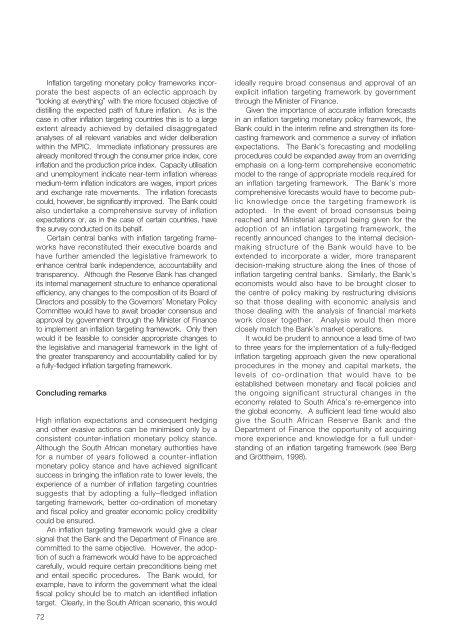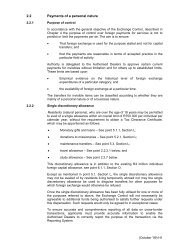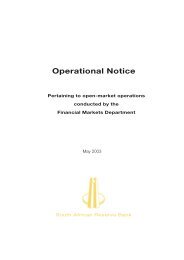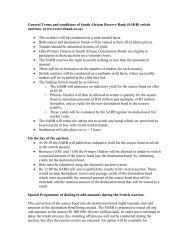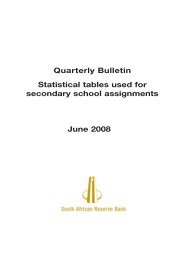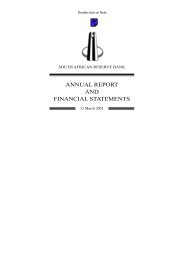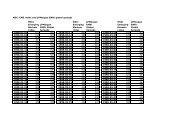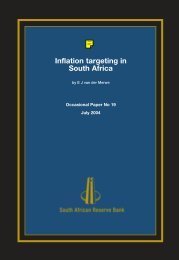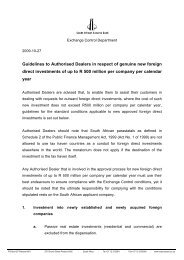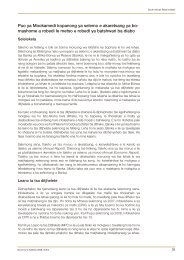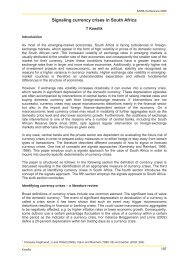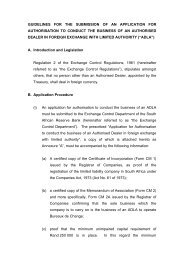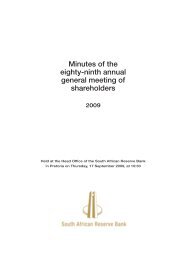Article: Quarterly Bulletin - South African Reserve Bank
Article: Quarterly Bulletin - South African Reserve Bank
Article: Quarterly Bulletin - South African Reserve Bank
Create successful ePaper yourself
Turn your PDF publications into a flip-book with our unique Google optimized e-Paper software.
Inflation targeting monetary policy frameworks incorporate<br />
the best aspects of an eclectic approach by<br />
“looking at everything” with the more focused objective of<br />
distilling the expected path of future inflation. As is the<br />
case in other inflation targeting countries this is to a large<br />
extent already achieved by detailed disaggregated<br />
analyses of all relevant variables and wider deliberation<br />
within the MPIC. Immediate inflationary pressures are<br />
already monitored through the consumer price index, core<br />
inflation and the production price index. Capacity utilisation<br />
and unemployment indicate near-term inflation whereas<br />
medium-term inflation indicators are wages, import prices<br />
and exchange rate movements. The inflation forecasts<br />
could, however, be significantly improved. The <strong>Bank</strong> could<br />
also undertake a comprehensive survey of inflation<br />
expectations or, as in the case of certain countries, have<br />
the survey conducted on its behalf.<br />
Certain central banks with inflation targeting frameworks<br />
have reconstituted their executive boards and<br />
have further amended the legislative framework to<br />
enhance central bank independence, accountability and<br />
transparency. Although the <strong>Reserve</strong> <strong>Bank</strong> has changed<br />
its internal management structure to enhance operational<br />
efficiency, any changes to the composition of its Board of<br />
Directors and possibly to the Governors’ Monetary Policy<br />
Committee would have to await broader consensus and<br />
approval by government through the Minister of Finance<br />
to implement an inflation targeting framework. Only then<br />
would it be feasible to consider appropriate changes to<br />
the legislative and managerial framework in the light of<br />
the greater transparency and accountability called for by<br />
a fully-fledged inflation targeting framework.<br />
Concluding remarks<br />
High inflation expectations and consequent hedging<br />
and other evasive actions can be minimised only by a<br />
consistent counter-inflation monetary policy stance.<br />
Although the <strong>South</strong> <strong>African</strong> monetary authorities have<br />
for a number of years followed a counter-inflation<br />
monetary policy stance and have achieved significant<br />
success in bringing the inflation rate to lower levels, the<br />
experience of a number of inflation targeting countries<br />
suggests that by adopting a fully–fledged inflation<br />
targeting framework, better co-ordination of monetary<br />
and fiscal policy and greater economic policy credibility<br />
could be ensured.<br />
An inflation targeting framework would give a clear<br />
signal that the <strong>Bank</strong> and the Department of Finance are<br />
committed to the same objective. However, the adoption<br />
of such a framework would have to be approached<br />
carefully, would require certain preconditions being met<br />
and entail specific procedures. The <strong>Bank</strong> would, for<br />
example, have to inform the government what the ideal<br />
fiscal policy should be to match an identified inflation<br />
target. Clearly, in the <strong>South</strong> <strong>African</strong> scenario, this would<br />
72<br />
ideally require broad consensus and approval of an<br />
explicit inflation targeting framework by government<br />
through the Minister of Finance.<br />
Given the importance of accurate inflation forecasts<br />
in an inflation targeting monetary policy framework, the<br />
<strong>Bank</strong> could in the interim refine and strengthen its forecasting<br />
framework and commence a survey of inflation<br />
expectations. The <strong>Bank</strong>’s forecasting and modelling<br />
procedures could be expanded away from an overriding<br />
emphasis on a long-term comprehensive econometric<br />
model to the range of appropriate models required for<br />
an inflation targeting framework. The <strong>Bank</strong>’s more<br />
comprehensive forecasts would have to become public<br />
knowledge once the targeting framework is<br />
adopted. In the event of broad consensus being<br />
reached and Ministerial approval being given for the<br />
adoption of an inflation targeting framework, the<br />
recently announced changes to the internal decisionmaking<br />
structure of the <strong>Bank</strong> would have to be<br />
extended to incorporate a wider, more transparent<br />
decision-making structure along the lines of those of<br />
inflation targeting central banks. Similarly, the <strong>Bank</strong>’s<br />
economists would also have to be brought closer to<br />
the centre of policy making by restructuring divisions<br />
so that those dealing with economic analysis and<br />
those dealing with the analysis of financial markets<br />
work closer together. Analysis would then more<br />
closely match the <strong>Bank</strong>’s market operations.<br />
It would be prudent to announce a lead time of two<br />
to three years for the implementation of a fully-fledged<br />
inflation targeting approach given the new operational<br />
procedures in the money and capital markets, the<br />
levels of co-ordination that would have to be<br />
established between monetary and fiscal policies and<br />
the ongoing significant structural changes in the<br />
economy related to <strong>South</strong> Africa’s re-emergence into<br />
the global economy. A sufficient lead time would also<br />
give the <strong>South</strong> <strong>African</strong> <strong>Reserve</strong> <strong>Bank</strong> and the<br />
Department of Finance the opportunity of acquiring<br />
more experience and knowledge for a full understanding<br />
of an inflation targeting framework (see Berg<br />
and Gröttheim, 1998).


